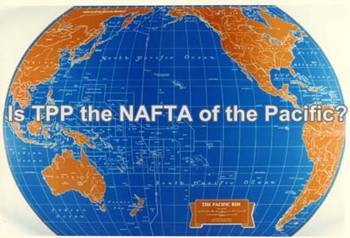Obama’s Free Trade Agreement: Backdoor deal with corporate America?

LA Progressive | January 30, 2012
Obama’s Free Trade Agreement: Backdoor deal with corporate America?
By Timothy Robertson and Matt Kavanagh
Last week’s State of the Union heralded some of the strongest language yet out of President Obama about the need to reform Wall Street and corporate actions and address income inequality.
But actions speak louder than words. And this week, in a $500 a night Beverly Hills Hotel, the Obama administration’s U.S. Trade Representative is gathering in secret with negotiators from around the world for a session that could create a whole new set of international trade rules: rules that favor the wealthy 1% of corporate interests. This leaves many of us in the labor, environment, and AIDS activist communities frustrated and confused.
That’s why, this week, activists in and around L.A. are holding a series of events to educate and mobilize the push back.
Negotiated away of the public spotlight, the Trans Pacific Free Trade Agreement (TPP for short) would likely be the largest regional free trade agreement the United States has ever seen. Negotiators want new “NAFTA of the Pacific” set of rules for the global economic highway that could eventually include every Pacific Rim nation from Vietnam, Thailand, and Japan to Australia, Canada, Mexico and Russia. And instead of an open, transparent process the text is completely secret to the public while hundreds of corporate lobbyists from the biggest drug companies, job-killing corporations, major global banks, and agribusiness giants have been registered as “advisors” to the process.
So what’s at stake? Most of the text is secret, but we’ve had some leaks and we know what certain interests are pushing for. This week in Los Angeles they’re focused on Intellectual Property and later in San Diego they’re tacking other issues. And we know that on the table are plans for:
– Offshored jobs and lower wages: One of the most crucial issues facing an Asia-Pacific trade pact is the question of labor rights. The Trans-Pacific pact’s labor provisions will play a large role in determining whether jobs at home and human rights abroad are adequately protected, yet we still don’t know for sure how the United States proposes to tackle this issue. The signs, though, point to a deal that would “offshore” manufacturing and service sector jobs, reduce the tax base and put a downward pressure on the wages and benefits in the jobs that are left because of a failure to protect the rights of workers in the agreement.
– Wall Street give away: Bankers and traders wants to use the Trans-Pacific FTA to roll back new safeguards many nations have passed to get banks and securities firms under control and restore financial stability. They are proposing to lock in the extreme deregulation that led to the devastating financial crisis.
– Restrictions on internet & information freedom: Leaked text would actually make it a criminal act to knowingly receive copyright infringing material or even “aiding or abetting”– sending law enforcement into our homes, internet service providers, and even libraries to search for copyrighted materials. It would also require governments to give “legal incentives” to internet service providers to police the internet–cutting off the free flow of information.
– Deadly new powers and higher prices for Big Pharma: Right now Big Pharma wants nothing more than to shut down the follow of totally legal, completely safe generic medications cutting into their profits. Following their lead, the US Trade Representative has proposed the most radical expansion of patents ever included in a trade deal. It would expand what can be patented, make longer patents, and even outlaw the process in many countries that lets the public challenge patents they know to be bogus before they’re granted. For Americans that means higher drug prices in our state and local health programs; for people in developing countries it means death without affordable lifesaving medicines for AIDS and other diseases.
– Letting corporations sue the government for profits: U.S. negotiators have led to charge to include the notorious “investor-state” enforcement system. This empowers corporations to go to World Bank and UN foreign tribunals to directly challenge a country’s domestic policies and demand tax payer compensation if they think our safety laws, environmental regulations, or civil/human rights protections undermine their “expected future profits.”
So there is much to worry about. It’s time for us to start pushing back hard.
The President and Congress need to recognize that the mood of the American public has changed, and it should abandon any fantasy that something as big and all-encompassing as a Pacific Rim trade deal can somehow be snuck past voters. People simply will not put up any longer with trade policy that forwards the interests of the 1% at the expense of the 99%.
If elected officials are serious about changing the power balance in Washington—of building a fairer set of rules for the economy—this is a place to start. No Trans Pacific Free Trade Deal for the 1%.
Timothy Robertson and Matt Kavanagh
Timothy Robertson is Director of the California Fair Trade Coalition and Matt Kavanagh is an activist with Health GAP (Global Access Project).





